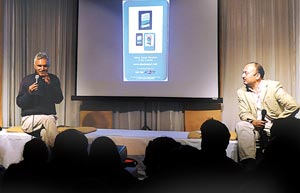Nepali literature turns to e-publications

Kathmandu: As digital and e-readers slowly take over, it seems the word ‘bookworm’ will have to be redefined. Statistics indicate the sale of e-books have risen over 100% in one year in America.
Through the collaboration of publication nepa~laya and e-commerce company muncha.com, Nepal is jumping on the band wagon and is now offering e-publication of Nepali works of literature.
“Distribution of Nepali books to places beyond Nepal has been a great challenge to Nepali publishers. We now have a solution,” said Kiran Krishna Shrestha of nepa~laya.
Till date, sending books across the globe has been a hassle but now, a few simple clicks will give you access to multiple formats that can be used on a variety of devices.
“E-publishing does not only mean selling the books in PDF format, there are close to 20 formats in practice. However three formats which sum up compatibility to more than 95% of the devices have been made available for our readers,” shared Amrit Man Tuladhar of muncha.com.
For now, readers have the option of downloading books in PDF, ePUB and MOBI formats depending on the compatibility with iPads, Kindles, computers, smart phones and other devices.
The first Nepali e-books, Palpasa Café and Mayur TimesI, both by the Editor of Nagarik, Naryan Wagle, were launched at nepa~la on Friday. Wagle says, “Lot of people living abroad wanting to read my books complain about the difficulties and high costs of getting the book.
I am glad I will not have to listen to such complaints anymore.” Mayur Times is available in Devangari script while both English and Nepali editions of Palpasa Café are available as well.
Wagle further adds, “Rather than the business aspect of it, the feeling of my work being available everywhere gives me a sense of great satisfaction.
"But the business aspect of it is a factor to be considered. Globally e-publications have gained popularity for a range of reasons including being environmentally friendly, much more agreeable for portability, and of course, the price.
With sales reaching close to 50,000, Palpasa Café is probably the best selling Nepali literary book of recent times. While all of Wagle’s novels are available for Rs 300 at Pilgrims Book House, online all of the various formats can be purchased for a slightly lower fee of Rs 270.
Although those wishing to buy an e-book will have to register for free on the website, ebooks.muncha.com is user friendly and offers few payment options.
Those buying the e-books can use major credit cards (Visa, MasterCard, American Express and Discover), or a bank transfer from Nepal Investment Bank, Kumari Bank and Laxmi Bank. The other option is through Ipay, the prepaid system which currently allows users to buy e-books as well as music.
As to why nepa~laya and muncha.com are venturing into e-publication, Kiran Shrestha says, “Reports show, e-publishing has already taken 20% of the book market in the world, this is certainly the future of publication and we are trying to prepare for the future, before we lose out to technology.”
Although the publishers, online suppliers, and author are all happy about Nepali e-books, the success of it eventually comes down to the readers.
Shweta Karki, a 17 year old student at St Xaviers says, “I read whenever I get a chance,” but till date she prefers to read books in print, “I personally prefer hard copies, I find it special,” she says.
Though Karki has friends who have moved onto the digital formats, she explains, “Most people download books because it’s cheaper, it’s not that they prefer it.” Karki doesn’t own a Kindle and isn’t sure if any of her friends do either, most of those in her reading circle download books to their phones or onto their computers.
Kalzang Sherpa, 23, an accounting student shares, “I’m not too interested in reading but if I do read I always use hard copies – I don’t think I’d ever use digital readers.
” Even if she might not opt to read a book off of a screen, Sherpa adds, “It makes me happy that Nepali books are available online and it’s getting that space.”
Though some current readers may not be ready to let go of tattered and yellowed pages, e-publications might gain popularity with the future generations as it’s another means of catching up with the more developed world, either ways reading won’t have lost its luster.
source: republica, 27 Nov 2011
Posted on: 2011-11-27































